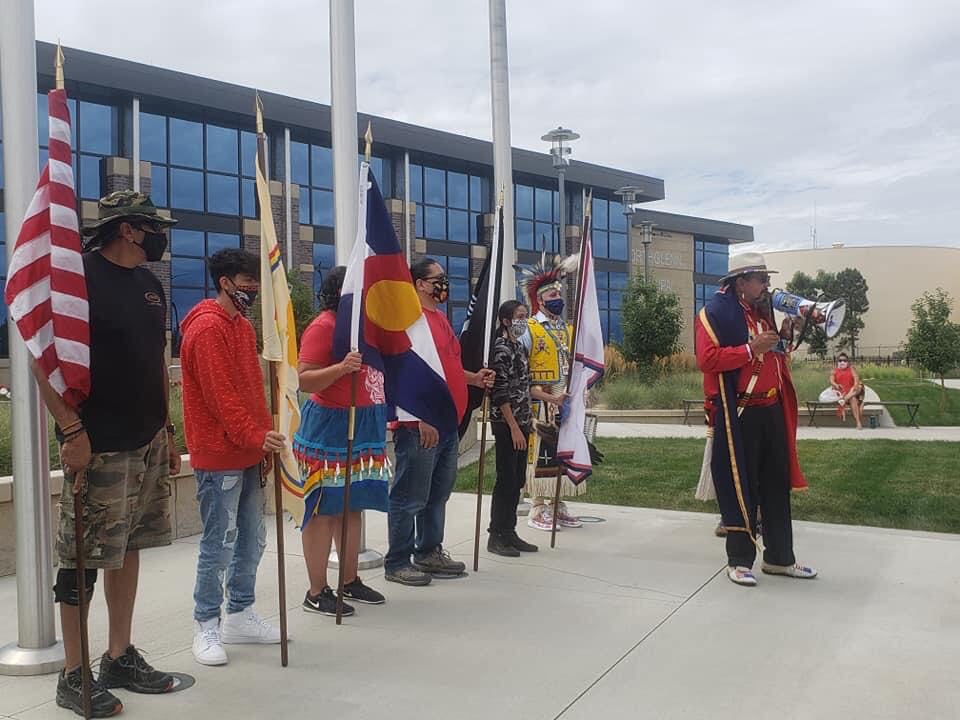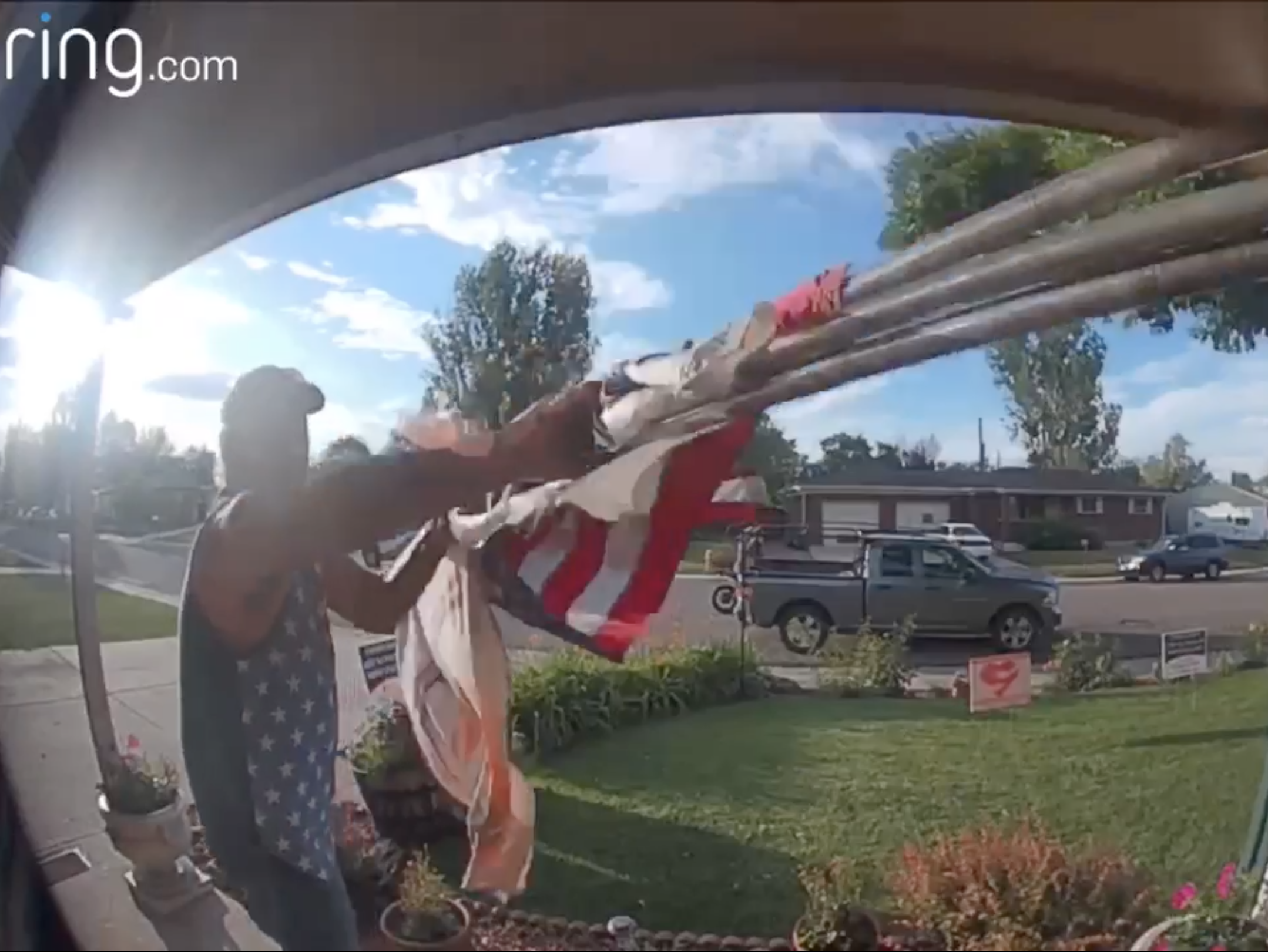
- Details
- By Levi Rickert
DENVER, Colo. – Gerald Montour is still seeking justice for the theft of two nation flags – the Diné (Navajo) Nation flag and the Cheyenne River Sioux Tribe flag – that were stolen from the front porch of his and wife Linda’s home in Northglenn, Colo., a northern Denver suburb, over the July 4th weekend.
Gerald is Diné and Haudenosaunee; his wife is a tribal citizen of the Cheyenne River Sioux Tribe.
Related: Tribal Flags Stolen from Native American Veteran’s Porch in Denver Suburb
Upon returning from a short trip to the mountains, the couple discovered the tribal flags and an upside-down American flag were missing. The couple’s Ring doorbell camera captured a man in a pickup truck pulling up to their home and stopping. The man got out of his truck and walked up to the flags and stole them. On his way back to his truck with the stolen flags, he turned and hit their door with the flag poles.
 A Denver couple’s home security camera captured a man wearing a t-shirt emblazoned with the American flag stealing two tribal flags, as well as an American flag, from their house. (Screen capture courtesy D. Montour)
A Denver couple’s home security camera captured a man wearing a t-shirt emblazoned with the American flag stealing two tribal flags, as well as an American flag, from their house. (Screen capture courtesy D. Montour)
But before leaving, the man turned toward the house and shouted obscenities.
With the help of a neighbor who took down the man’s license plate number, police identified the man as Jimmy Nichols, 59, from Erie, Colo. After a short telephone interview with Nichols they charged him with two misdemeanors for theft and criminal mischief.
Montour, a Vietnam-era veteran, says those charges are not severe enough.
He organized a March for Justice on Sunday to get the Northglenn Police Department to do a more thorough job of investigating Nichols.
Some 90 people came out to show solidarity with the Montours. The march was from a local park near their home to the Northglenn Justice Center, the home of the police department and municipal court.
“They were out talking to me and within 30 minutes they called me back and told me they were charging him with the two misdemeanors. I want them to do a thorough investigation. He should be charged with a hate crime or ethnic intimidation,” Montour said.
The police say Nichols, the owner of Camo Construction in Erie, Colo., can’t be charged with a hate crime or ethnic intimidation because he denied knowing who lived in the house and did not see what the tribal flags represented because they were not flying but were furrowed.
In an interview with Native News Online on Monday, Nichols repeated what he told police and denied knowing the meaning of the flags.
“My brother lives in the neighborhood. I pick him up for work every day and I got mad because the American flag was upside down. I didn't even know what those other flags were so it cannot be a hate crime,” Nichols said.
Nichols burned the tribal flags and handed over the American flag to the Northglenn Police Department.
Montour said he had the American flag upside down because right now the country is in trouble because of COVID-19, treaties not being honored and the atrocities still being done against brown people.
“I am a man of God and would apologize for what I did,” Nichols said.
He said he has a court date in either late September or early October.
More Stories Like This
Native News Weekly (August 25, 2024): D.C. BriefsUS Presidents in Their Own Words Concerning American Indians
Letter from Publisher: We Fell Short of Our Online Year-End Goal
Happy New Year 2026 from Native News Online
Next on Native Bidaské: Covering Indian Country: Lessons from 2025 & the Road Ahead
Help us defend tribal sovereignty.
At Native News Online, our mission is rooted in telling the stories that strengthen sovereignty and uplift Indigenous voices — not just at year’s end, but every single day.
Because of your generosity last year, we were able to keep our reporters on the ground in tribal communities, at national gatherings and in the halls of Congress — covering the issues that matter most to Indian Country: sovereignty, culture, education, health and economic opportunity.
That support sustained us through a tough year in 2025. Now, as we look to the year ahead, we need your help right now to ensure warrior journalism remains strong — reporting that defends tribal sovereignty, amplifies Native truth, and holds power accountable.
 The stakes couldn't be higher. Your support keeps Native voices heard, Native stories told and Native sovereignty defended.
The stakes couldn't be higher. Your support keeps Native voices heard, Native stories told and Native sovereignty defended.
Stand with Warrior Journalism today.
Levi Rickert (Potawatomi), Editor & Publisher

